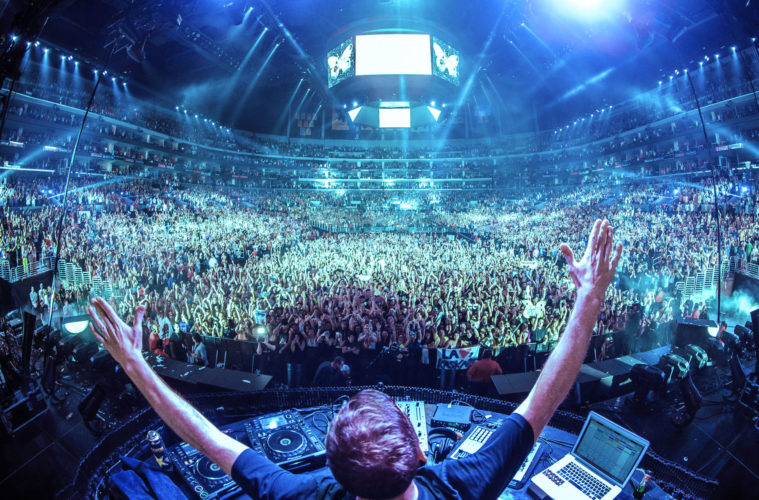EDM music has been around for a long time. Artists like David Guetta have been on the scene since the late 1980s when the dance floor mostly moved to disco music. The counter-culture of the time began demanding a different kind of music. Party-goers wanted to dance, but not to the cheesy anthems of the era. The disco sucks movement was born, and the underground began producing and performing house music.
Guetta describes the humble beginnings of house music as an evolution with and away from disco. Acapella and B-sides were combined with synthesized drum beats to create tunes that were played to small audiences in clubs. Records were hard to find and made their name on the dance floor with party-goers who wouldn’t know where to look to track them down.
Chart-Topping EDM
Fast-forward to the present day and EDM music has entered the mainstream. Fully. Chart-topping hits and collaborations have brought DJs old and new to the ears of the masses.
The live EDM scene is now a $6.2 billion global industry. Most of the money comes from festivals like the massive Ultra and TomorrowWorld. Clubs around the world, from Vegas to Ibiza, also contribute to a growing economy of dance music, as do shows and events, which increasingly turn to EDM DJs for entertainment. Recently, German producer Zedd played a 90-minute DJ set at the PokerStars Barcelona Championship. It’s a sign of the times. EDM is here, and everyone wants a part of it!
A handful of the same DJs who were around in the early days of house music evolved with the times and now stand as the world’s superstars of EDM, often pulling in $250,000 per night.
Guetta is a perfect example of a DJ who moved with the times. His collaborations with Kelly Rowland on “When Love Takes Over” and Black Eyed Peas on “I Gotta Feeling” demonstrate the coming together of EDM and mainstream pop music. It’s no wonder Guetta’s net worth is over $75 million, and he has 55 million followers.
That’s a lot of money, but not quite as much as Calvin Harris, the highest paid DJ in the world and a regular U.K. chart-topper, thanks to collaborations, including hits with Rihanna. He has also won several prestigious music awards, including a GRAMMY.
The New Wave
Old timers like Guetta and Tiesto have been joined by more top-notch DJs over the years, with relative newcomers like Afrojack, Deadmau5 and Carl Cox joining the ranks. More recently, the explosive duo Dimitri Vegas & Like Mike have been pumping dance floors and festivals since they hosted Tomorrowland for the first time in 2010. They are now rated second in DJ Mag’s Top 100 list. They also happened to land their first gig by talking to DJs on Facebook.
Social media has played a significant role in the popularity of EDM music, with listeners and DJ fans now able to find and share music from a genre that used to be underground, and artists able to attract massive followings and book gigs.
The equipment has also evolved. From the early days of turntables and vinyl (What’s that, you ask?!), to CD decks and then to digital DJs. Love it or hate it, the accessibility of new equipment has made it easier for bedroom DJs to give it a go, and some to find their fame. The equipment may have made mixing easier, but it also opened the door to more creativity during performances — EDM DJs have to do more to stand out.
EDM has grown from a small sub-culture of rebellion against disco into house music and then the mainstream, with hugely successful international DJs leading the way and pop collaborations topping the charts. These DJs are in demand at festivals, clubs and events across the world. The industry has already been around for 20 years and it’s still growing. For better or worse, EDM is here to stay.


